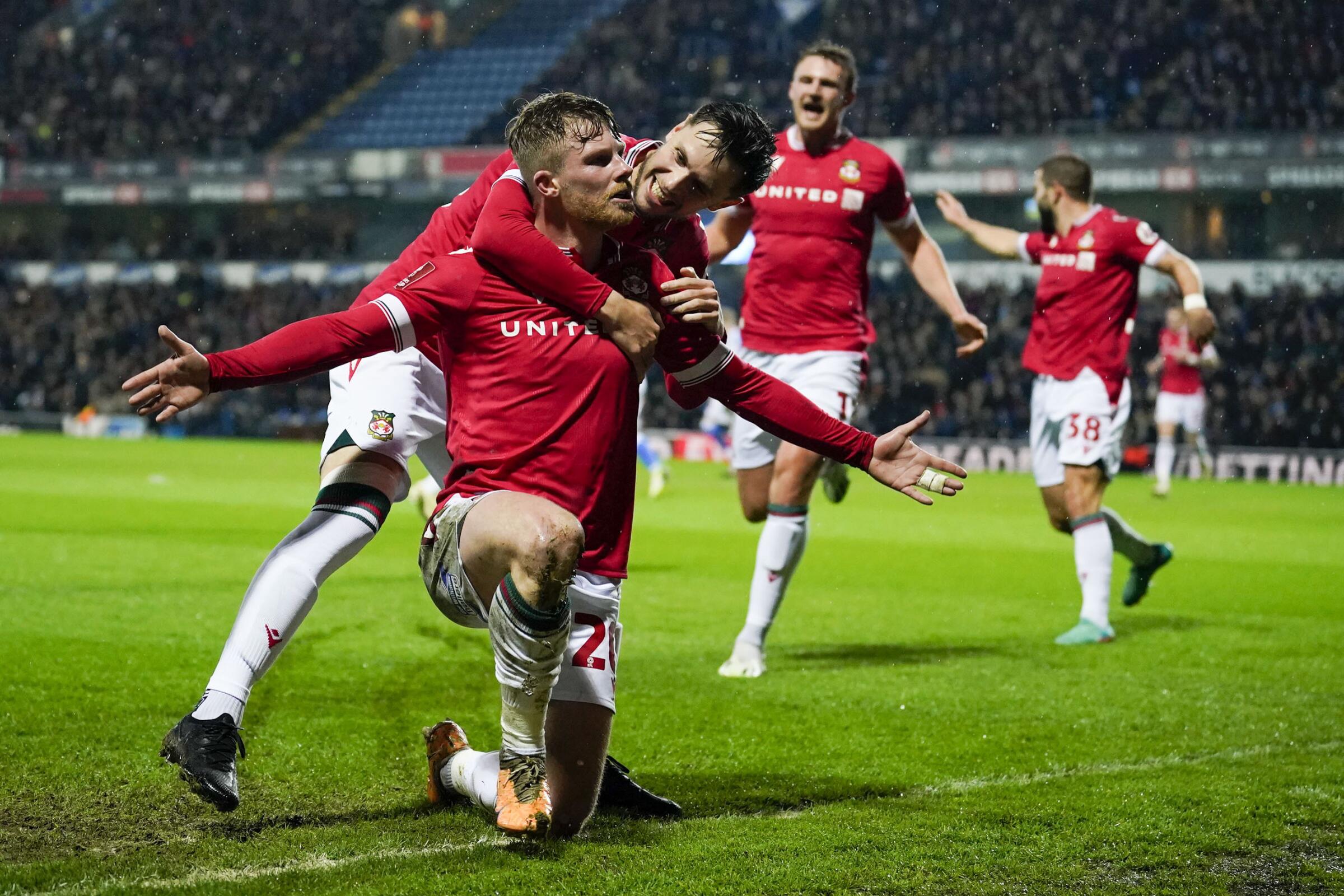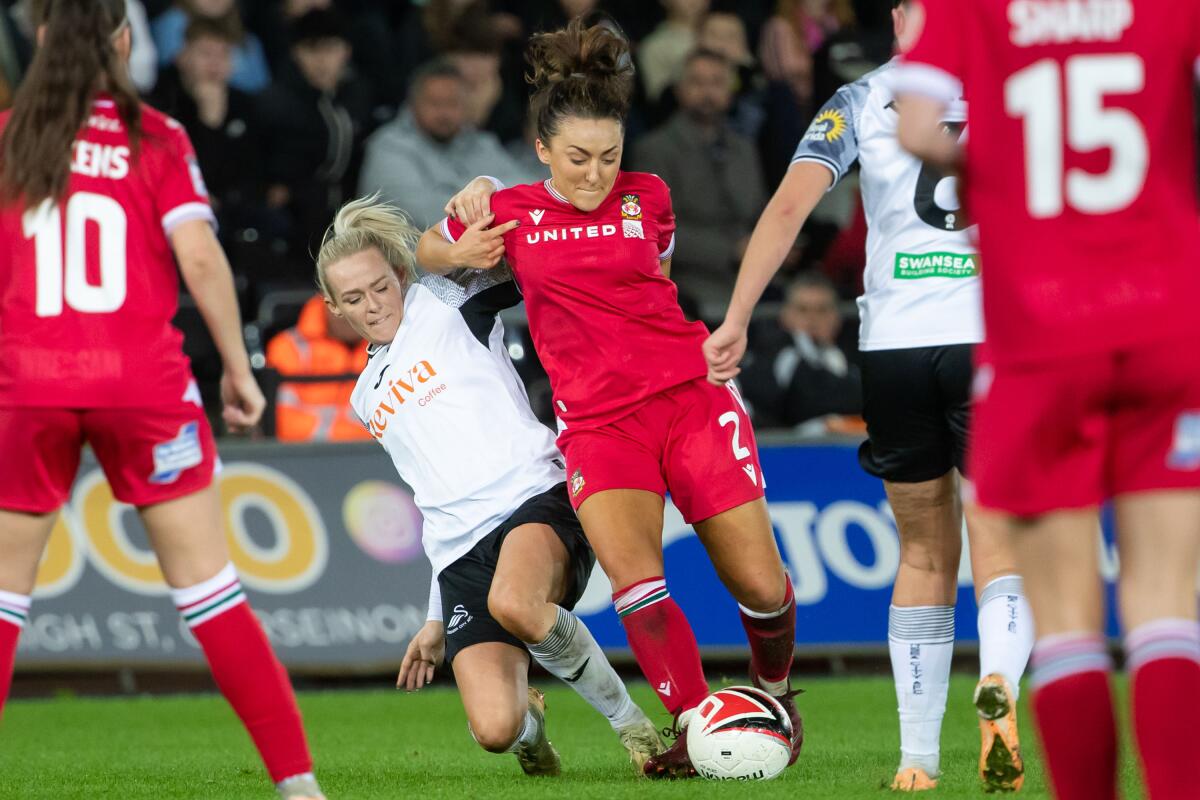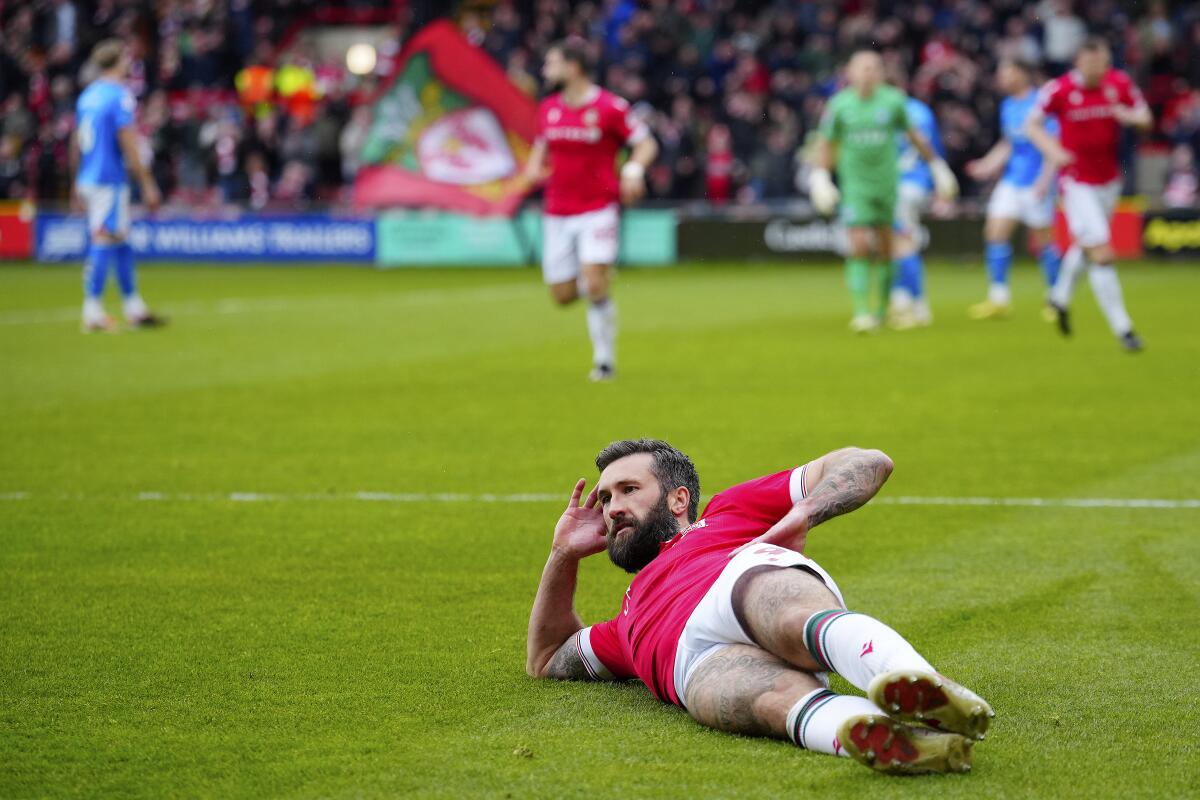Go beyond the scoreboard
Get the latest on L.A.'s teams in the daily Sports Report newsletter.
You may occasionally receive promotional content from the Los Angeles Times.

Most lower-division soccer clubs are run on a shoestring budget. Salaries are normally poor and the infrastructure — locker rooms, playing fields — even poorer.
But when you’re a lower-division soccer club owned by two Hollywood heavyweights, what’s normal doesn’t apply. And that explains how the Wrexham men’s team, newly promoted to League One, the third tier of the English football pyramid, and the women’s team, which finished third in the semi-pro Adran Premier league last season, find themselves spending part of their preseason touring the U.S., a perk generally reserved for massive clubs such as Barcelona, Real Madrid and Manchester United.
“That’s pretty cool,” said a giddy Gemma Owen, head of women’s football operations for Wrexham AFC. “We’re still approaching this in the same manner that we would a regular preseason. This is very serious for us to be playing against teams that are going to challenge us, that are going to provide the right level of competition.
“But the other side of it that’s really important to us is being able to play in the U.S. So yeah, we’re really excited about it.”
In “Welcome to Wrexham,” Ryan Reynolds and Rob McElhenney try to revive Wrexham’s soccer club — and the struggling Welsh town that depends on it.
They wouldn’t be doing that had actors Ryan Reynolds (“Deadpool,” “Van Wilder”) and Rob McElhenney (“It’s Always Sunny in Philadelphia”) not bought the down-on-its-luck club, the third-oldest in professional soccer, in 2020.
Wrexham had tumbled to the lowest rungs of the English soccer system and was on the verge of financial collapse while the tiny working-class Welsh city the team calls home had also fallen on hard times, declining along with its soccer team. Reynolds and McElhenney were convinced they could revive the town by reviving the team and they wanted to document how they did that.
The result is “Welcome to Wrexham,” the Emmy-winning behind-the-scenes docuseries was recently renewed for a fourth season. It airs on FX and streams on Hulu.
For the players, the change in ownership meant not just promotion up the English soccer ladder, but higher salaries, celebrity rare for players in a lower-tier league and summer tours of the U.S.

“We’re very fortunate to play for Wrexham,” forward Ollie Palmer said. “These preseason tours are special. These are top-10 Premier League preseason tours where you get to go and travel, play in unbelievable stadiums against unbelievable competition. And we’re very lucky to be doing that.”
The Wrexham women will play two games at UCLA — on Friday against SoCal FC and Sunday against Tigres Femenil’s U19 team — and another in Portland, Ore., on July 26 against the Thorns’ academy squad. The men’s team, returning to the U.S. for a second straight summer, will play Premier League clubs Bournemouth and Chelsea on Saturday in Santa Barbara and July 24 in Santa Clara, respectively, before heading to Canada for a friendly with the Vancouver Whitecaps.
But if the plot of the docuseries was the effort to save the team and the city, the stars of the show quickly became hard-working and humble team employees and players, such as Palmer and Rosie Hughes, who works at a prison when she’s not on the pitch.
For players on the Wrexham women’s soccer team, pursuing a passion for the game can mean taking up job as a prison guard or a dishwasher to make it work.
“We’re aware of how big the docuseries is,” Palmer said. “When we first got to America on tour, we kind of realized how much people really enjoyed the show and taken to some of the players. That’s quite strange, you know, people coming up to you on the other side of the pond, you’re having dinner and some American person wants a picture.”
But that level of notoriety, in which the players are seen more as TV stars than as athletes, has drawn in people who might have never been closer to a soccer match than their TV screens. Those are the people Owen hopes to play for on the tour.
“To be able to play live in front of some of those people is an honor for us,” she said. “If we can play any part, however big or small, in encouraging someone to go and watch women’s football, that’s certainly an incredible thing.
“We remind the girls regularly, ‘Look, this is what you’re doing. This is a legacy that you’re creating.’ We’re very, very honored to be a part of that.”

But the main priority is preparing for the regular season, which begins next month for the men and in September for the women. Because if the docuseries has brought the team back and the team has helped bring the town back, neither have gone as far as they want to go.
“That’s what we’re paid to do. That’s our full focus,” Palmer, who has helped the team get promoted twice in as many seasons, said of playing soccer. “Ryan and Rob have created a documentary, which has done extremely well. But that is on the side.
“Ultimately, we do just want to be players. But obviously when someone comes up and they say [nice] things, it makes you feel good. That’s why I think sports are important: it changes people’s lives, it gives people a purpose.
“It’s great to be able to do that for people.”
⚽ You have read the latest installment of On Soccer with Kevin Baxter. The weekly column takes you behind the scenes and shines a spotlight on unique stories. Listen to Baxter on this week’s episode of the “Corner of the Galaxy” podcast.
Go beyond the scoreboard
Get the latest on L.A.'s teams in the daily Sports Report newsletter.
You may occasionally receive promotional content from the Los Angeles Times.